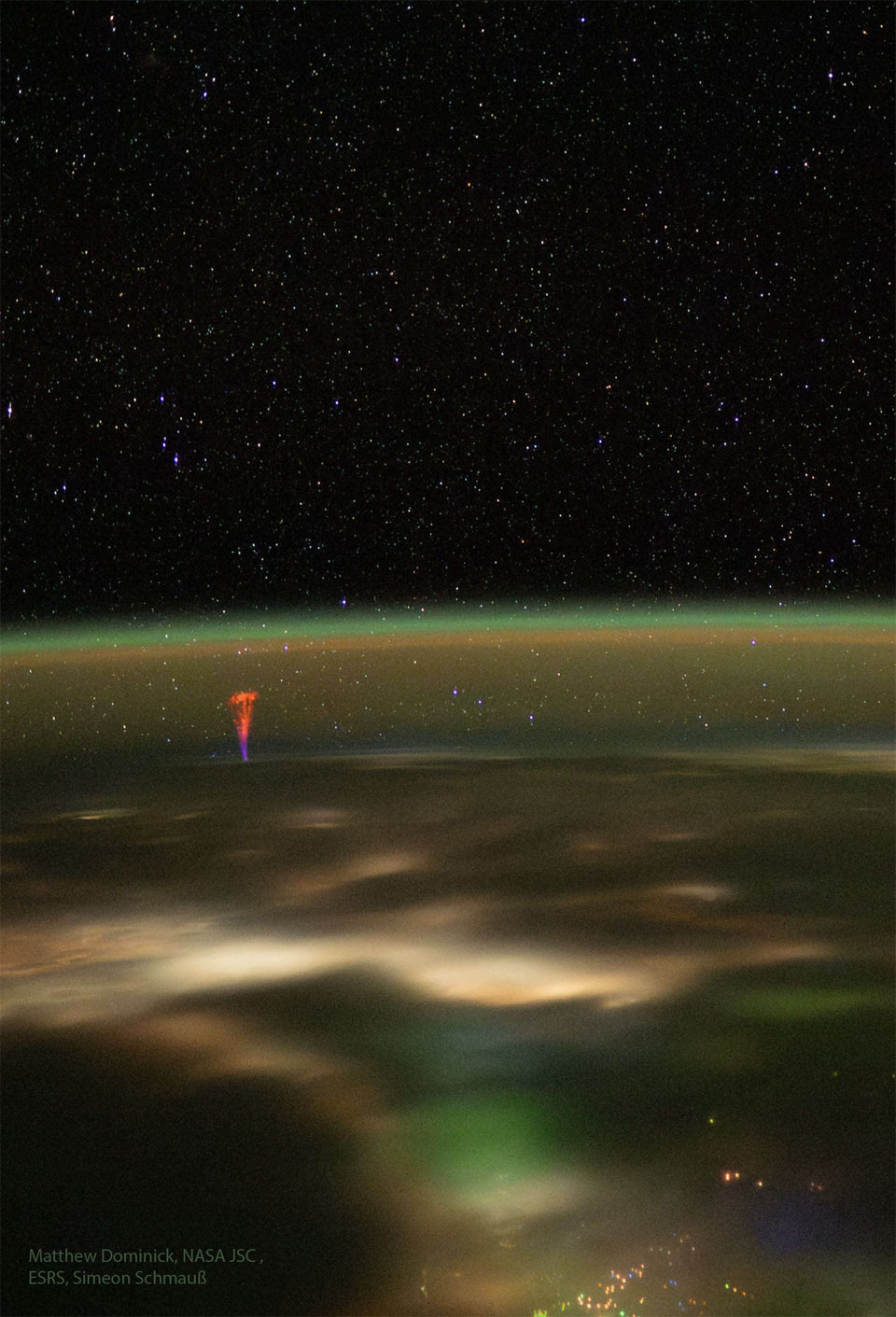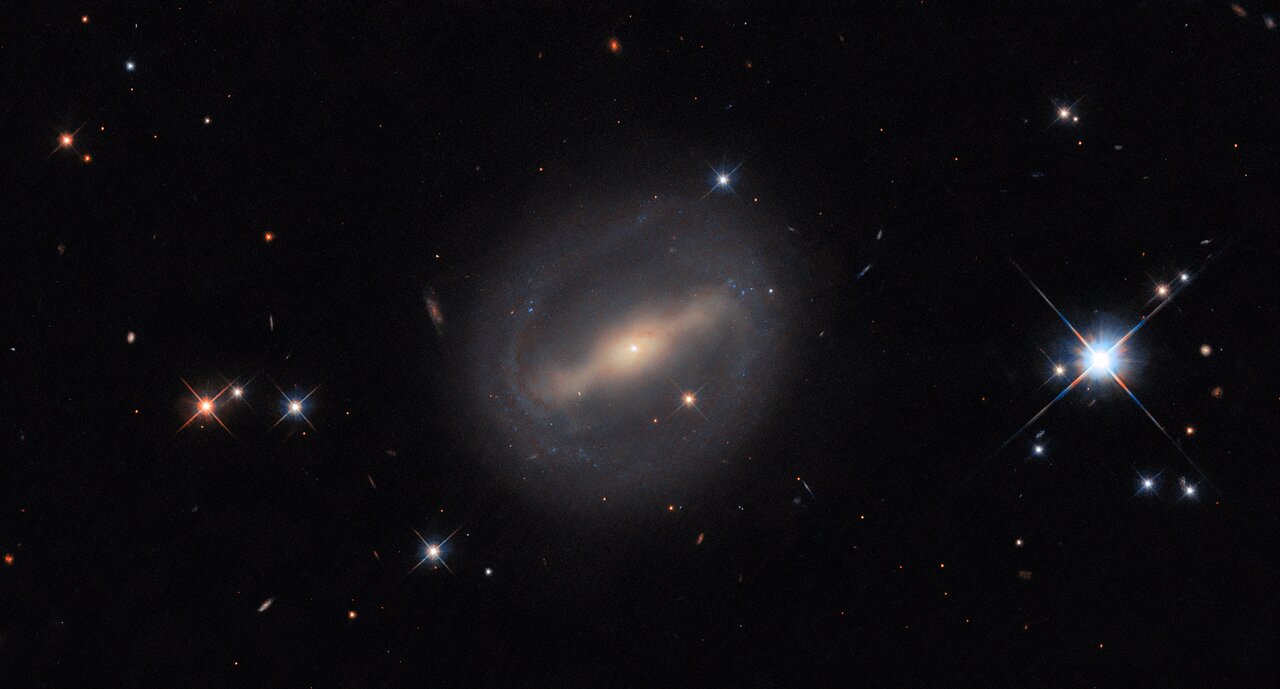Blog
Hezekiah Leroy Gordon Smith (August 14, 1909 – September 25, 1967), better known as Stuff Smith, was an American jazz violinist. He is well known for the song “If You’re a Viper” (the original title was “You’se a Viper”).
Smith was, along with Stéphane Grappelli, Michel Warlop, Svend Asmussen, Ray Nance and Joe Venuti, one of jazz music’s preeminent violinists of the swing era. He was born in Portsmouth, Ohio, United States in 1909, and studied violin with his father.
more...When circling the Earth on the International Space Station early last month, astronaut Matthew Dominick saw an unusual type of lightning just beyond the Earth’s edge: a gigantic jet. The powerful jet appears on the left of the featured image in red and blue. Giant jet lightning has only been known about for the past 23 years. The atmospheric jets are associated with thunderstorms and extend upwards towards Earth’s ionosphere. The lower part of the frame shows the Earth at night, with Earth’s thin atmosphere tinted green from airglow. City lights are visible, sometimes resolved, but usually creating diffuse white glows in intervening clouds. The top of the frame reveals distant stars in the dark night sky. The nature of gigantic jets and their possible association with other types of Transient Luminous Events (TLEs) such as blue jets and red sprites remains an active topic of research.

more...
Daniel Grayling Fogelberg (August 13, 1951 – December 16, 2007) was an American singer, songwriter, and multi-instrumentalist. He is primarily known for his 1980s soft rock hits, including “Longer” (1980), “Same Old Lang Syne” (1981), and “Leader of the Band” (1982). Dan Fogelberg was born in Peoria, Illinois. In May 2004, Fogelberg was diagnosed with advanced prostate cancer. After undergoing therapy, his cancer went into partial remission. In August 2005, Fogelberg announced the success of his cancer treatments. However, his cancer returned and on December 16, 2007, Fogelberg died at home in Deer Isle, Maine, at the age of 56.
more...Joe Puma (August 13, 1927 – May 31, 2000) was an American jazz guitarist.
Puma was born in the Bronx, New York. His first professional experience came with Joe Roland in 1949–50. He played in the band led by Cy Coleman. He acted as a session musician for many jazz musicians during the 1950s, including Louie Bellson, Artie Shaw‘s Gramercy Five, Eddie Bert, Herbie Mann, Mat Mathews, Chris Connor, and Paul Quinichette, Lee Konitz, and Dick Hyman; he also recorded extensively as a leader at this time. In the 1960s, he worked with Morgana King, Bobby Hackett, Gary Burton, and Carmen McRae, and between 1972 and 1977 he and Chuck Wayne led an ensemble. He continued to perform and teach into the late 1990s.
more...Frank “Son” Seals (August 13, 1942 – December 20, 2004) was an American electric blues guitarist and singer. In 2009, Seals was inducted into the Blues Hall of Fame.
Seals was born in Osceola, Arkansas, where his father, Jim “Son” Seals, owned a small juke joint, called the Dipsy Doodle Club. He began performing professionally by the age of 13, first as a drummer with Robert Nighthawk and later as a guitarist. At age 16, he began to play at the T-99, a local upper-echelon club, with his brother-in-law Walter “Little Walter” Jefferson. He played there with prominent blues musicians, including Albert King, Rufus Thomas, Bobby Bland, Junior Parker, and Rosco Gordon.
more...Sir George Albert Shearing OBE (13 August 1919 – 14 February 2011) was a British jazz pianist who for many years led a popular jazz group that recorded for Discovery Records, MGM Records and Capitol Records. Shearing was the composer of over 300 songs, including the jazz standards “Lullaby of Birdland” and “Conception“, and had multiple albums on the Billboard charts during the 1950s, 1960s, 1980s and 1990s.
more...Robert Henry “Baby Boy” Warren (August 13, 1919 – July 1, 1977), was an American blues singer and guitarist who was a leading figure on the Detroit bluesscene in the 1950s.
Warren was born in Lake Providence, Louisiana, in 1919, and at the age of three months moved with his parents to Memphis, Tennessee. He was interested in music from an early age and was working occasionally as a musician from around 1931, when he dropped out of school, having learned to play guitar from two of his older brothers.
more...Anna Mae Winburn (née Darden; August 13, 1913 – September 30, 1999) was an American vocalist and jazzbandleader who flourished beginning in the mid-1930s. An African-American, she is best known for having directed the International Sweethearts of Rhythm, an all-female big band that was perhaps one of the few – and one of the most – racially integrated dance-bands of the swing era. In 1944, the band was named as the country’s favorite all-female orchestra in a DownBeatmagazine poll.
Anna Mae Darden was born in Port Royal, Tennessee, to Andrew Jackson Darden (1881–1956) and Lula Carnell (maiden; 1882–1929), a musical family.
more...“Big Chief” Russell Moore (August 13, 1912 – December 15, 1983) was an American jazz trombonist. Moore, a Pima tribe member, grew up on a Native American reservation before moving to Chicago and then Los Angeles where he learned to play various instruments, eventually settling on trombone. Throughout his career, Moore worked with an array of artists including Frank Sinatra, Lionel Hampton, Alberta Hunter and Pee Wee Russell as well as recording under his own name. He is best remembered for his work as a member of Louis Armstrong’s band.
more...The subject of this week’s circular Hubble Picture of the Week is situated in the Perseus Cluster, also known as Abell 426, 320 million light-years from Earth. It’s a barred spiral galaxy known as MCG+07-07-072, seen here among a number of photobombing stars that are much closer to Earth than it is.
MCG+07-07-072 has quite an unusual shape, for a spiral galaxy, with thin arms emerging from the ends of its barred core to draw a near-circle around its disc. It is classified, using a common extension of the basic Hubble scheme, as an SBc(r) galaxy: the c denotes that its two spiral arms are loosely wound, each only performing a half-turn around the galaxy, and the (r) is for the ring-like structure they create. Rings in galaxies come in quite a few forms, from merely uncommon, to rare and astrophysically important!
Lenticular galaxies are a type that sit between elliptical and spiral galaxies. They feature a large disc, unlike an elliptical galaxy, but lack any spiral arms. Lenticular means lens-shaped, and these galaxies often feature ring-like shapes in their discs. Meanwhile, the classification of “ring galaxy” is reserved for peculiar galaxies with a round ring of gas and star formation, much like spiral arms look, but completely disconnected from the galactic nucleus– or even without any visible nucleus! They’re thought to be formed in galactic collisions. Finally, there are the famous gravitational lenses, where the ring is in fact a distorted image of a distant, background galaxy, formed by the ‘lens’ galaxy bending light around it. Ring-shaped images, called Einstein rings, only form when the lensing and imaged galaxies are perfectly aligned.
[Image Description: A galaxy. It is almost circular. It has a glowing bar stretching across its core; from the ends of the bar, thin spiral arms wrap around the galaxy to form a closed disc. The arms are fuzzy from the dust and stars they contain. The galaxy is on a black, mostly-empty background. A few foreground stars with cross-shaped diffraction spikes can be seen, as well as some distant galaxies in the background.]

Patrick Bruce Metheny (born August 12, 1954) is an American jazz guitarist and composer.
He was the leader of the Pat Metheny Group (1977–2010) and continues to work in various small-combo, duet, and solo settings, as well as other side projects. His style incorporates elements of progressive and contemporary jazz, latin jazz, and jazz fusion. He has three gold albums and 20 Grammy Awards, and is the only person to have won Grammys in 10 categories.
Metheny was born in Lee’s Summit, Missouri.
more...
Peter Ostroushko (August 12, 1953 – February 24, 2021) was an American violinist and mandolinist. He performed regularly on the radio program A Prairie Home Companion and with a variety of bands and orchestras in Minneapolis–Saint Paul and nationally. He won a regional Emmy Award for the soundtrack he composed for the documentary series Minnesota: A History of the Land(2005).
Born August 12, 1953, and of Ukrainian ancestry, Ostroushko grew up in northeast Minneapolis where he first took up mandolin at age three.
more...Mark Freuder Knopfler OBE (born 12 August 1949) is a British guitarist, singer, songwriter, and record producer. He was the lead guitarist, singer and songwriter of the British rock band Dire Straits from the group’s formation in 1977 until their dissolution in 1995. He pursued a solo career after the group disbanded, and is now an independent artist.
Knopfler was born in Glasgow, and raised in Blyth, near Newcastle, England. After graduating from the University of Leeds and working for three years as a college lecturer, Knopfler co-founded Dire Straits with his younger brother, David Knopfler. The band recorded six albums, including Brothers in Arms (1985), one of the best-selling albums in history. After Dire Straits permanently disbanded in 1995, Knopfler began a solo career, and has produced nine solo albums. He has composed and produced film scores for nine films, including Local Hero (1983), Cal (1984), The Princess Bride (1987), Wag the Dog (1997) and Altamira(2016). He has produced albums for Tina Turner, Bob Dylan, and Randy Newman.
Described by Classic Rock as a virtuoso, Knopfler is a fingerstyle guitarist and was ranked 27th on Rolling Stone‘s list of the “100 Greatest Guitarists of All Time”.With Dire Straits, Knopfler sold between 100 million and 120 million records. A four-time Grammy Awardwinner, Knopfler is the recipient of the Edison Award, the Steiger Award and the Ivor Novello Award, as well as holding three honorary doctorate degrees in music from universities in the United Kingdom. Knopfler was inducted into the Rock and Roll Hall of Fame as a member of Dire Straits in 2018.
more...Roy James Gaines (August 12, 1937 – August 11, 2021) was an American Texas blues and electric blues guitarist, singer and songwriter. He wrote and recorded the song “A Hell of a Night”, which was first issued on his 1982 album Gainelining. He was the younger brother of the blues musician Grady Gaines.
Gaines was born in Waskom, Texas on August 12, 1937, and relocated with his family to Houston when he was six years old. Originally a piano devotee, Gaines moved to playing the guitar in his adolescence. In his teens he was acquainted with another budding guitarist, Johnny Copeland. By the age of 14 he had performed onstage backing his hero, T-Bone Walker, and played in Houston nightclubs. He later moved to Los Angeles, California.
more...More Posts
- Ben Riley Day
- Joe Morello Day
- World Music with Lingling Yu & Guo Gan
- Daily Roots with Rula Brown
- The Cosmos with M91
- Rubén Blades Day
- Desmond Dekker Day
- Cal Tjader Day
- World Music with Hà Nội Duo
- Daily Roots with Earl Sixteen ft Ranking Joe
- The Cosmos with Sun and ISS
- John Bream Day
- Philly Joe Jones
- Washboard Sam Day
- World Fusion with Mehdi Nassouli & Enza Pagliara
- Daily Roots with Little Roy
- The Cosmos with NGC 3147
- Angelique Kidjo Day
- Kenny Napper Day
- Alan Dawson Day

